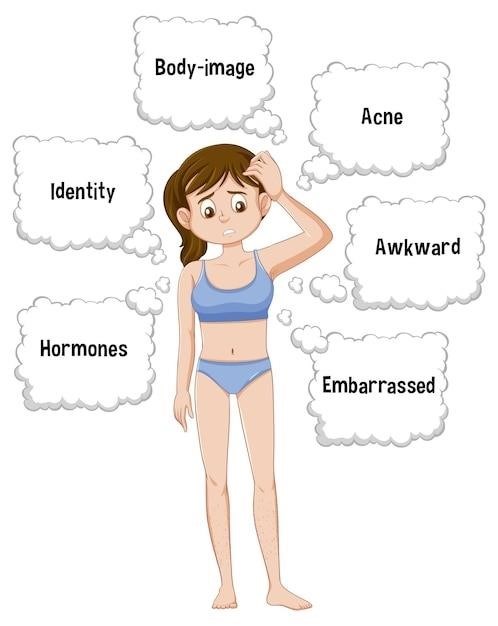A Girl’s Guide to Puberty⁚ What to Expect
Puberty is a natural process that all girls go through as they transition from childhood to adulthood. It’s a time of exciting and sometimes confusing changes, both physically and emotionally. This guide will help you understand what to expect during puberty, from the first signs of breast development to the arrival of your period. We’ll cover the stages of puberty, the physical and emotional changes you might experience, and tips for managing this exciting time in your life.
What is Puberty?
Puberty is a natural process of physical and emotional changes that girls go through as they transition from childhood to adulthood. It’s a time of growth and development, preparing your body for the possibility of becoming pregnant. Puberty is triggered by hormones, which are chemicals produced by your body that signal changes in your body. The most important hormone for puberty is estrogen, which is produced in the ovaries. Estrogen is responsible for many of the physical changes of puberty, including breast development, pubic hair growth, and menstruation.
The age at which puberty starts can vary widely. It’s perfectly normal for puberty to begin at any point between the ages of 8 and 13 in girls. If puberty doesn’t start around the average age, it’s a good idea to speak to your doctor for advice. It’s important to remember that everyone’s body is different, and there’s no right or wrong time to go through puberty.
The Stages of Puberty
Puberty happens in stages, with each stage bringing about specific changes. While the timeline can differ for every girl, it’s helpful to understand the general progression. Think of it like a journey with exciting milestones along the way. Here’s a breakdown of the typical stages⁚

- Stage 1⁚ This is the pre-puberty stage, where there are no noticeable changes yet.
- Stage 2⁚ This is when the first signs of puberty begin to appear, such as breast bud development, pubic hair growth, and a slight increase in height.
- Stage 3⁚ This is when puberty starts to pick up pace, with breasts getting larger, pubic hair becoming more prominent, and body odor becoming more noticeable.
- Stage 4⁚ This is the stage where most of the major physical changes of puberty are complete. Breasts are fully developed, pubic hair is thick and adult-like, and menstruation begins.
- Stage 5⁚ This is the final stage of puberty. All of the physical changes are complete, and the body is now fully mature.
It’s important to remember that these are just general guidelines. Every girl goes through puberty at her own pace, and there’s no need to compare yourself to others.
Physical Changes
Puberty brings about a range of physical changes that are part of your body’s journey to becoming an adult. These changes can be exciting, sometimes a little confusing, and definitely a lot to process. Here’s a look at some of the most common physical changes you might experience during puberty⁚
- Breast Development⁚ This is usually the first sign of puberty for girls; Your breasts will start to develop breast buds, which feel like small bumps under your nipples. They’ll gradually grow larger and become more rounded.
- Pubic Hair Growth⁚ You’ll start noticing fine hair growing around your vulva. This hair will gradually become thicker and darker.
- Menstruation⁚ This is a normal and healthy part of a woman’s life. Your first period, also known as menarche, is a sign that your body is ready to have a baby. You’ll experience bleeding from your vagina for a few days each month.
- Growth Spurt⁚ During puberty, you’ll experience a sudden increase in height. This growth spurt usually lasts for a few years.
- Changes in Body Shape⁚ Your hips will widen, and your waist will become more defined. Your body will start to take on a more feminine shape.
- Acne⁚ Hormonal changes during puberty can cause your skin to become more oily, which can lead to acne.
Remember, every girl’s experience is unique. These changes might happen at different times for you and your friends, and that’s perfectly normal. If you have any questions or concerns about the physical changes you’re experiencing, don’t hesitate to talk to your parents or a doctor.
Breast Development
Breast development is often the first noticeable sign of puberty in girls. It can be a thrilling and sometimes a little confusing experience. Here’s what you can expect⁚
- Breast Buds⁚ You’ll first notice small bumps, about the size of a nickel, under your nipples. These are called breast buds, and they’re the beginning of your breasts forming.
- Gradual Growth⁚ Over time, your breasts will gradually grow larger and become more rounded. The shape and size of your breasts will vary from girl to girl, and that’s completely normal.
- Tenderness and Sensitivity⁚ You might experience some tenderness and sensitivity in your breasts as they develop. This is also normal and will usually subside over time.
- Asymmetry⁚ Don’t be surprised if one breast grows slightly faster than the other. It’s common for breasts to develop at different rates.
- Different Stages⁚ Breast development happens in stages. It can take several years for your breasts to reach their full size.

Remember, breast development is a natural part of puberty. If you have any questions or concerns, talk to your parents or a doctor. They can provide you with more information and reassurance.
Pubic Hair Growth
Pubic hair growth is another important sign of puberty. It’s a natural part of becoming a woman, and it’s nothing to be ashamed of. Here’s what you need to know⁚
- First Appearance⁚ Pubic hair usually starts to appear around the same time as breast development, but it can vary from girl to girl. It might start as a few fine hairs around your vulva, the area between your legs.
- Growth Pattern⁚ As you go through puberty, pubic hair will become thicker, darker, and grow in a more triangular pattern, covering the area around your vulva.
- Individual Variations⁚ The amount and pattern of pubic hair growth can vary greatly from person to person. There’s no “right” way for it to grow.
- Hygiene⁚ It’s important to keep your pubic area clean and dry. You can use mild soap and water to wash the area, and make sure to change your underwear regularly.
- Shaving and Waxing⁚ If you choose to shave or wax your pubic hair, make sure to do it carefully to avoid cuts or irritation.
Remember, pubic hair growth is a normal part of puberty. If you have any questions or concerns, talk to your parents or a doctor. They can provide you with more information and reassurance.
Menstruation
Menstruation, often called your period, is a normal part of a girl’s reproductive cycle and a sign that your body is preparing for pregnancy. Here’s what you need to know about menstruation⁚
- What Happens⁚ Every month, your ovaries release an egg. If the egg isn’t fertilized, the lining of your uterus, called the endometrium, sheds, and this is what you experience as your period.
- First Period⁚ The first period, called menarche, usually occurs between the ages of 10 and 16, but it can vary. It’s perfectly normal to feel nervous or even scared about your first period, but remember, it’s a natural part of growing up.
- Flow and Duration⁚ The amount and duration of your period can vary from month to month. Some girls experience a light flow for a few days, while others have a heavier flow for a longer time.
- Pads and Tampons⁚ You’ll need to use sanitary pads or tampons to absorb the menstrual flow.
- Cramps⁚ Many girls experience cramps during their periods, which can be caused by muscle contractions in the uterus. Pain relievers can help manage cramps.
If you have any questions or concerns about menstruation, don’t hesitate to talk to your parents or a doctor. They can provide you with information and support.
Emotional Changes
Puberty isn’t just about physical changes; it also brings a wave of emotional changes. These changes are completely normal and are part of growing up. You might experience a range of emotions, including⁚
- Mood Swings⁚ Hormones can cause rapid shifts in mood, making you feel happy one minute and frustrated the next. It’s important to remember that these mood swings are temporary and will eventually settle down.
- Increased Sensitivity⁚ You might find yourself feeling more sensitive to criticism or feeling more easily upset. This is because your body is going through a lot of changes, and it’s normal to feel a little more emotional than usual.
- Self-Consciousness⁚ As your body changes, you might become more self-conscious about your appearance. It’s important to remember that everyone goes through puberty, and you’re beautiful just the way you are.
- New Interests⁚ You might find yourself developing new interests and hobbies. This is because your brain is developing and you’re exploring new ideas and possibilities.
If you’re struggling to cope with the emotional changes of puberty, it’s important to talk to someone you trust, like a parent, teacher, or counselor. They can provide support and guidance as you navigate this time in your life.
Tips for Managing Puberty
Puberty can be a confusing and sometimes overwhelming time, but there are things you can do to make it easier to manage. Here are a few tips⁚
- Talk to Someone⁚ Don’t be afraid to talk to your parents, a trusted adult, or a doctor about your concerns. They can provide support and guidance as you navigate this time in your life.
- Educate Yourself⁚ Reading about puberty can help you understand what to expect and feel less anxious about the changes happening to your body.
- Practice Self-Care⁚ Make sure you’re getting enough sleep, eating healthy foods, and exercising regularly. These things can help you manage stress and feel your best.
- Embrace Your Uniqueness⁚ Remember that everyone goes through puberty at their own pace. Don’t compare yourself to others or feel pressured to fit a certain mold.
- Find Healthy Ways to Cope⁚ If you’re feeling stressed or overwhelmed, try activities like yoga, meditation, or spending time in nature. These activities can help you relax and manage your emotions.
Puberty is a normal and natural part of growing up. By taking care of yourself and seeking support when needed, you can navigate this time with confidence and grace.
Talking to Your Parents or a Doctor
It’s normal to have questions and concerns about puberty. Your parents and doctor are there to support you and provide accurate information. Don’t be afraid to talk to them about anything that’s on your mind, no matter how small or embarrassing it may seem. Here are some things to keep in mind⁚
- Choose the Right Time and Place⁚ Find a time when you can have a private conversation with your parents or doctor. Pick a place where you feel comfortable and relaxed.
- Be Specific⁚ Instead of saying, “I have a question about puberty,” be specific about what you’re curious about. This will help them understand what you need and provide the most helpful information.
- Write Down Your Questions⁚ If you’re feeling shy or nervous, write down your questions beforehand. This will help you remember everything you want to ask.
- Listen Carefully⁚ Pay attention to what your parents or doctor have to say. Don’t be afraid to ask for clarification if you don’t understand something.
- Trust Your Gut⁚ If you’re not comfortable talking to your parents or doctor, you can always talk to another trusted adult, like a teacher, counselor, or family friend.
Remember, talking openly and honestly about puberty is important for your physical and emotional health. Don’t hesitate to reach out for help if you need it.
